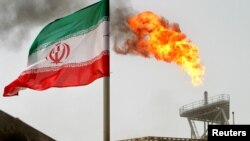Beijing has lashed out at a U.S. decision to impose sanctions on countries that buy Iranian oil, warning that it will intensify turmoil in the Middle East and in the international energy market.
"China firmly opposes the U.S. implementation of unilateral sanctions and its so-called long-armed jurisdiction," Foreign Ministry spokesman Geng Shuang said at a Tuesday press briefing.
The White House announced on April 22 that the United States will not renew exemptions granted in 2018 to five buyers of Iranian oil -- top customer China as well as India, Turkey, South Korea, and Japan -- pressuring importers to stop buying from Tehran.
The exemptions, or waivers, allowed the five countries to buy Iranian oil without facing U.S. sanctions. The White House has said that the decision to end them is intended to bring Iran's oil exports -- a key source of revenue for the authoritarian government -- to zero.
The United States has said it was working with Saudi Arabia and the United Arab Emirates, two of the largest oil exporters, to ensure the market was "adequately supplied."
Saudi Arabia, Iran’s main regional rival, welcomed the U.S. decision to end all Iran sanctions waivers by May.
"Saudi Arabia fully supports this step...as it is necessary to force the Iranian regime to end its policy of destabilizing stability and its support and sponsorship of terrorism around the world," Foreign Minister Ibrahim al-Assaf said on April 23.
Japan has said it expects a limited impact from the U.S. decision.
"We will closely watch international oil markets and exchange views with Japanese companies involved in crude imports and may consider taking necessary measures," Japan’s trade and industry minister Hiroshige Seko said on April 23.
A spokesman for Iran's Foreign Ministry dismissed the U.S. decision on April 22, calling sanctions "illegal" and saying that the country "did not and does not attach any value or credibility to the waivers.”
The United States quit a 2015 deal between Iran and world powers that granted Tehran sanctions relief in exchange for restrictions on its nuclear program.
Renewed U.S. sanctions have hit Iran's economy and contributed to the fall of the national currency, the rial.
Some information was provided by AP, AFP and Reuters






